24 mars 2020 mercredi
46 degrees, Rain
10 mph, NNE wind
Work to be done in March
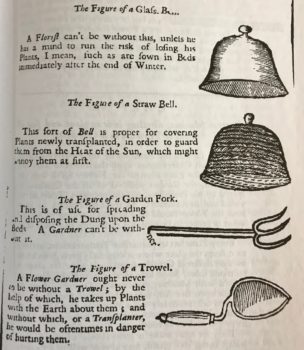
Sieur Louis Liger d’Auxerre., “The compleat florist” Illustration
In wet Earths Plant all sorts of Trees in this Month, as Pear-Trees, Apple-Trees, Peach-Trees, Apricok-Trees and Plum-Trees…
Towards the End of the Month Sow in the naked Earth, all sorts of Salleting-Seeds, except Golden Purslane, and also Seeds of Edible Roots.
Sprinkle Mould over the Beds you have Sown, and Plant Asparagus.
Tho’ you had Sown Peas in November and December, Sow more now, to have some when the first are gone.
-Francois Gentil, Le jardinier solitaire. 1706
The arrival of spring traditionally brings promise to the Illinois Country as plant life begins to emerge in its fields, meadows, and gardens. The appearance of these plants follows the lengthening hours of daylight and the warming temperatures, delivering welcome relief from a long winter and ease for our spirits. The change in seasons brings the awakening of life which is particularly important in this time of uncertainty. The Covid-19 pandemic is changing the fabric of our everyday life, both economically and socially. As one endeavors to stay healthy and safe, concern is felt for all, hoping for health and steadfastness in these disquieting times.
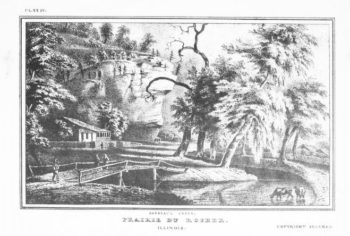
Barbeau’s Creek, Prairie du Rocher, Illinois. J. C. Wild, 1842
Over the centuries, the region has experienced the heartache and fear of widespread illness and epidemics. Noted historian Dr. Margaret Kimball Brown relays in her book, History As They Lived It, A Social History of Prairie du Rocher, Ill., the toll these illnesses took on communities:
An epidemic of some sort hit the village of Chartes in 1746-47. Although Prairie du Rocher itself seems to have been spared, some of the people affected at the village of Chartres owned farmland in the commonfields of Prairie du Rocher… There is no information what the disease was, but many of the deaths were said to be sudden. It also was reported in 1749 that, “in the last two years epidemic diseases carried off a good many of the inhabitants.”*
Because the families were interrelated and the villages were small enough so that all were acquainted, this would have been a shock for all communities. Several of these persons were prominent citizens, so the fabric of the villages was affected by their loss.
We are not the first, nor will we be the last, to experience such tragedy. One can imagine, in the early history of our communities, the importance of horticultural pursuits in times of crisis. The first colonists to North America were gardeners by necessity. The only food source was what they managed to grow and produce for themselves. Their gardens and the native plants found in the surrounding countryside functioned as a living pantry, providing the food and medicine for survival. While our immediate food and medicine supplies might be a bit challenging to secure in our current health crisis, they are nonetheless possible, an issue of access rather than supply. Although we might struggle with the prudent constraints that have been placed throughout society, the hope is that we all can find ways to mentally and physically be challenged and productive over the coming weeks.
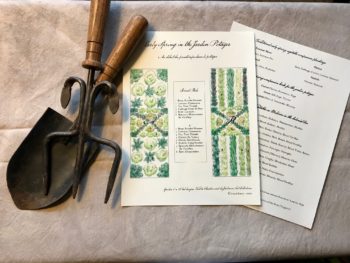
Early Spring Potager bed layout.
While restricted from time spent in the Fort jardin potager, my thoughts turn to preparing the designs and plans for the garden season ahead, a season that waits for no gardener. As bed layouts are finalized for some of the Fort’s jardin beds for early spring, the finished design is shared here for those who might be interested to explore and learn using our local garden history as a guide. Learn how companion planting contributed to the overall success of gardens over the centuries and how heritage plants themselves have a rich story and contribution to offer for sustenance and health. As we move through the weeks and months ahead, new seasonal designs for the jardin potager will be shared here on this blog. These designs are offered for the use and information of those seeking some guidance in their garden endeavors.
As we amend the garden soil with compost, aged manure, or other natural additions, we can begin to plant early spring vegetables now in late March. All the plant varieties listed in the jardin’s bed designs have been successfully grown in Zone 5b of the Illinois Country. The garden layouts will be based on the For de Chartres Jardin’s French Colonial heritage seed collection available on the website of the Heart of Illinois Country Shop. The plant varieties used in these garden layouts are heirloom, but please feel free to adjust these suggested heirlooms to modern vegetable varieties, if that is your desire. The early spring garden bed designs are meant to give guidance as to companion planting suggestions for the season. Also, if one would like to grow early spring vegetable varieties not shown in these designs, feel free to substitute and adjust the design as needed. Design substitution suggestions include leeks for onions, brassicas (broccoli, cauliflower, Brussel sprouts, turnips) for the cabbages and kale, and other root crops for carrots or radishes. The raised bed sizes shown in the layout is 4’ x 12’, as generally used in the Fort de Chartres jardin potager. Please change the size of the layout beds to fit your garden needs. The design is meant to be a guide and a suggestion.
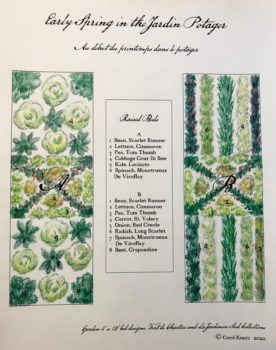 Offered here is the Early Spring jardin potager layout and as well as additional historical garden plant information, including the use of vegetable as early medicine is also available.
Offered here is the Early Spring jardin potager layout and as well as additional historical garden plant information, including the use of vegetable as early medicine is also available.
Downloadable garden PDF files are available here:
Early Spring Garden Design Layout
Early Spring Vegetable as Medicine
Jardin Potager Plant Varieties and History
These files are offered free for general use, in keeping with the Fort de Chartres Heritage Jardin Potager mission of sharing with the community. Need a few seeds? If anyone is in need of a small amount of the garden’s free sample seasonal heirloom seed packets (limit 6) or a print of the Early Spring Garden Design Layout, send inquiries and requests to heritage@fdcjardin.com. To view some of the seed types available, visit the Jardin Layout page. Just ask and will gladly share, if available.
Interested in joining this garden’s efforts to give back to our community and aid the Garden’s seed mission? Consider a simple donation for these efforts via the Fort de Chartres Jardin Potager or Les Amis du Fort de Chartres Facebook pages. A new fundraiser has been posted and shared on those pages to help those in this time of need, with the assistance of Les Amis du Fort de Chartres. For every $5 donated, $3 will be donated to the Prairie du Rocher Student Council Food Pantry. The remaining $2 will benefit the Fort de Chartres Heritage Jardin Potager Project to help to continue the project’s efforts to offer free sample seed packets. Support for this effort is appreciated. To donate by mail, contact heritage@fdcjardin. As always, the Fort de Chartres Heritage Jardin Potager Project thanks Les Amis du Fort de Chartres for their support.
For those readers interested in the French Colonial heirloom seed collections already listed on Les Amis’ Heart of Illinois County website, they can be found at the following link: Fort de Chartres Heritage Seed Collections.
The desire to connect and aid each other is never stronger than in times of challenge and crisis. The hope remains that we can support each other and offer assistance through positive actions. What is more uplifting than encouraging our community and gardening, cultivating new life that enriches body, mind, and spirit? Thank you for your support for our community and this heritage garden project.
Merci.
Carol Kuntz,
La Jardiniere
Fort de Chartres Heritage Garden Project
*Pease and Jenison, 1940, 103.
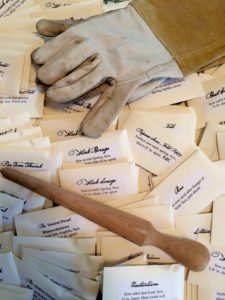



 Offered here is the Early Spring jardin potager layout and as well as additional historical garden plant information, including the use of vegetable as early medicine is also available.
Offered here is the Early Spring jardin potager layout and as well as additional historical garden plant information, including the use of vegetable as early medicine is also available.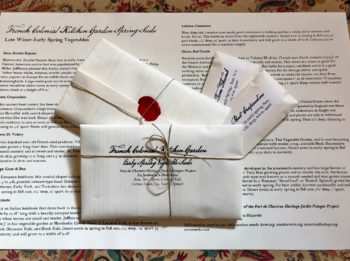
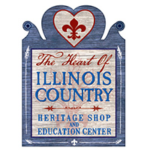
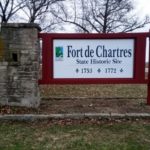 SPRINGFIELD, Ill. – To further prevent the spread of COVID-19, and in accordance with the Gubernatorial Disaster Proclamation issued on March 9, 2020, the Illinois Department of Natural Resources (IDNR) today announced the closure of all state parks, fish and wildlife areas, recreational areas, and historic sites as well as the cancellation of upcoming scheduled events.
SPRINGFIELD, Ill. – To further prevent the spread of COVID-19, and in accordance with the Gubernatorial Disaster Proclamation issued on March 9, 2020, the Illinois Department of Natural Resources (IDNR) today announced the closure of all state parks, fish and wildlife areas, recreational areas, and historic sites as well as the cancellation of upcoming scheduled events.
Recent Comments